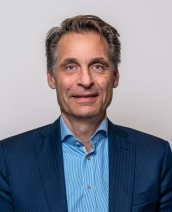Michael Kolk
Michaël helps clients in the chemicals, life sciences and technology-intensive industries to identify, realize and sustain innovation-based growth and value creation.

Education
Past Experience

Michaël is a Partner who joined Arthur D. Little in 2000 and has been based in the Amsterdam and Kuala Lumpur offices. He leads our Global Technology & Innovation Management Practice and coordinates as well our Global Chemicals Practice.
His consulting focus finds itself in the areas of Growth and Innovation performance enhancement, primarily in the chemicals, life sciences, and other technology-intensive industries. He is a regular speaker at innovation conferences.
Michaël’s mission in his professional life is to help clients find and capture opportunities for sustainable growth and value creation. Very often this involves the “what” (strategy creation, opportunity scouting, business-case creation, etc.) alongside the “how” (innovation management, organization and process redesign, capability building, change management, etc.).
Before joining Arthur D. Little, Michaël worked for Shell Chemicals as a workgroup leader in its Amsterdam Technology Center, providing technical support to internal customers in downstream oil and chemicals.
Michaël holds an MSc in biochemistry from the University of Amsterdam and a Ph.D. in biophysical chemistry from Radboud University. In addition, he has attended the Executive Education program of Insead, France.
Michaël is married and has three young daughters. His other interests are literature, world politics, and popular science. In his spare time, he likes to run (regularly) and travel to the world’s more distant places (occasionally).

Opening the urban mine

The people-centric lab of the future

Big data? Big security!

Staying ahead of the curve

HARNESSING EXTERNAL DATA SHARING TO UNLOCK TRANSFORMATIVE COLLABORATION

Eyes in the sky: Opportunities from earth observation

ESG: Last call to take effective action

From good to great: Enhancing innovation performance through effective management processes


Michaël is a Partner who joined Arthur D. Little in 2000 and has been based in the Amsterdam and Kuala Lumpur offices. He leads our Global Technology & Innovation Management Practice and coordinates as well our Global Chemicals Practice.
His consulting focus finds itself in the areas of Growth and Innovation performance enhancement, primarily in the chemicals, life sciences, and other technology-intensive industries. He is a regular speaker at innovation conferences.
Michaël’s mission in his professional life is to help clients find and capture opportunities for sustainable growth and value creation. Very often this involves the “what” (strategy creation, opportunity scouting, business-case creation, etc.) alongside the “how” (innovation management, organization and process redesign, capability building, change management, etc.).
Before joining Arthur D. Little, Michaël worked for Shell Chemicals as a workgroup leader in its Amsterdam Technology Center, providing technical support to internal customers in downstream oil and chemicals.
Michaël holds an MSc in biochemistry from the University of Amsterdam and a Ph.D. in biophysical chemistry from Radboud University. In addition, he has attended the Executive Education program of Insead, France.
Michaël is married and has three young daughters. His other interests are literature, world politics, and popular science. In his spare time, he likes to run (regularly) and travel to the world’s more distant places (occasionally).

Opening the urban mine

The people-centric lab of the future

Big data? Big security!

Staying ahead of the curve

HARNESSING EXTERNAL DATA SHARING TO UNLOCK TRANSFORMATIVE COLLABORATION

Eyes in the sky: Opportunities from earth observation

ESG: Last call to take effective action

From good to great: Enhancing innovation performance through effective management processes

More About Michael
- Radboud UniversityPhD Physical Chemistry
- University of AmsterdamM.Sc. Biochemistry
- ShellWorkgroup Leader
